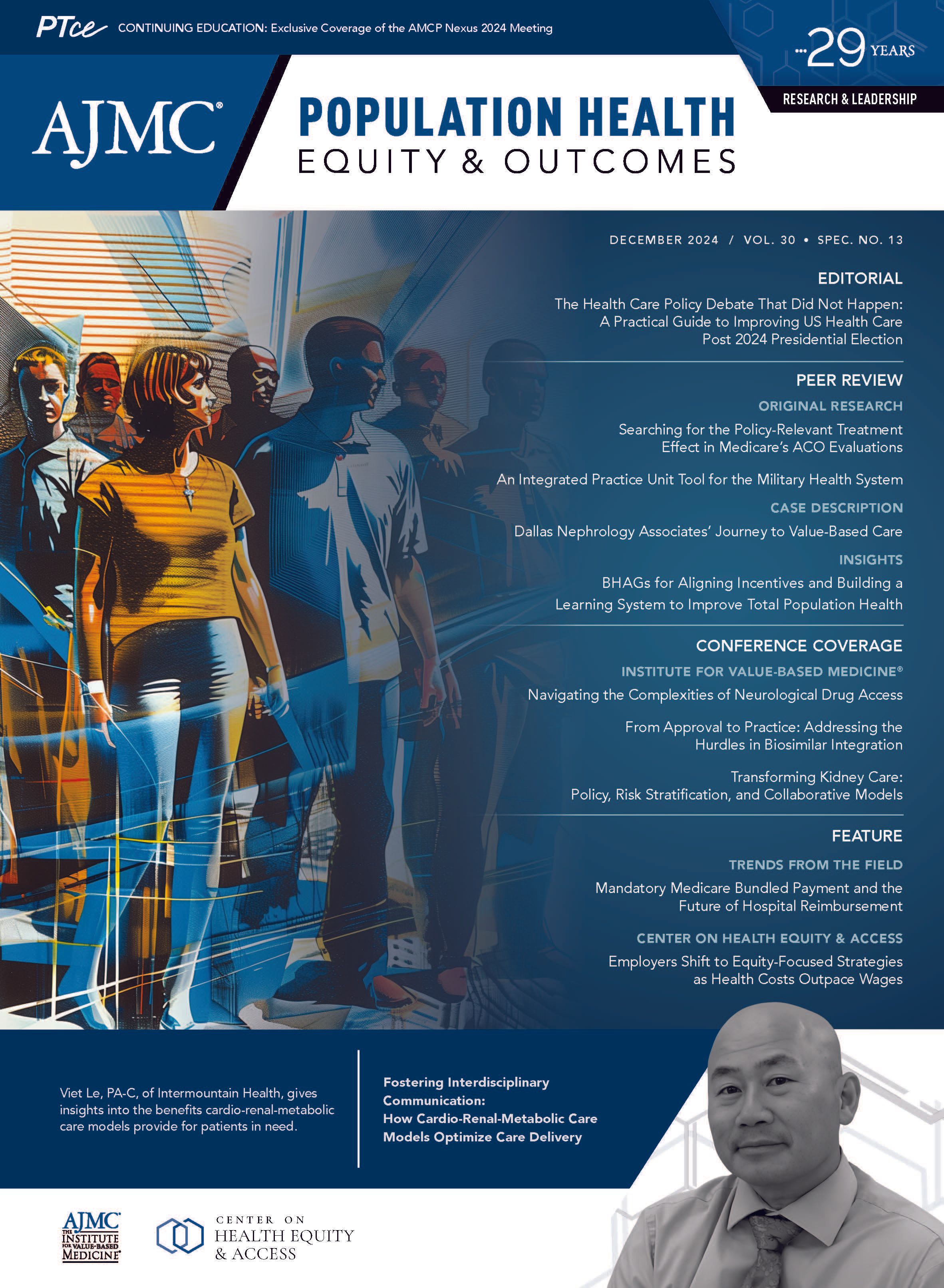Publication
Article
Population Health, Equity & Outcomes
Employers Shift to Equity-Focused Strategies as Health Costs Outpace Wages
Author(s):
Key Takeaways
- Rising healthcare costs are leading employers to shift costs to employees, affecting wages and benefits.
- Employers are implementing strategies like managed maternity benefits and early detection to manage high-cost claims.
As health care costs escalate, a new survey reveals that 74% of employers are grappling with the impact on employee wages and benefits, with many anticipating further cost-shifting to their workforce.
Am J Manag Care. 2024;30(Spec. No. 13):SP1059-SP1060. https://doi.org/10.37765/ajmc.2024.89657
In the face of escalating health care costs, a new survey reveals that 74% of employers are grappling with the impact on employee wages and benefits, with many anticipating further cost-shifting to their workforce.1 As they navigate these financial pressures, employers are increasingly prioritizing health equity initiatives and innovative strategies to manage high-cost claims, reflecting a critical shift in how organizations approach employee health and well-being in 2024.
As they navigate financial pressures, employers are increasingly prioritizing health equity initiatives.
Image Credit: everythingpossible - stock.adobe.com

National Alliance of Healthcare Purchaser Coalitions published findings from its Pulse of the Purchaser 2024 survey, conducted between September and October 2024. The survey provides a comprehensive overview of employer perspectives on health care costs, health equity, and strategies to manage high-cost claims. With responses from 188 employers across the nation, the report sheds light on the pressing concerns and innovative approaches being adopted in the current health care landscape.
Rising Health Care Costs and Employee Impact
One of the most significant findings from the survey is the overwhelming concern regarding rising health care costs. The majority of employers believe that increases in health care expenses often lead to trade-offs with salary or wage increases. This sentiment is echoed by 74% of respondents, who agree that higher health care costs will result in further cost-shifting to employees. As one survey respondent noted, “It’s not just about cost control anymore; it’s about survival."
Strategies to Mitigate High-Cost Claims
Employers are actively exploring various strategies in response to the challenges posed by high-cost claims. The survey highlights several key initiatives that employers are currently implementing or considering for the next 1 to 3 years:
- Reducing risk of neonatal intensive care unit (ICU) claims: 55% of employers are focusing on managed maternity and fertility benefits to mitigate risks associated with neonatal ICU claims
- Enhanced screening and early detection: 45% are prioritizing enhanced screening measures to catch health issues early
- Site of care redirection: 40% are considering redirecting care to more cost-effective settings, such as home infusion services
Commitment to Health Equity
The survey findings also reveal a growing commitment among employers to address health equity. A notable 74% of employers are engaging various departments to discuss company strategies related to health equity, marking a 15% increase from 2023. This trend indicates a broader recognition of the importance of equitable access to health care services.
Employers are also analyzing health equity data through various lenses, including race/ethnicity, income levels, and geographic location. Over 60% of employers are currently or considering analyzing health claims based on these factors, demonstrating a commitment to understanding and addressing disparities in health care access and outcomes.
Employers Want More PBM Transparency
Over half of employers are considering changing their pharmacy benefits manager (PBM) within the next 1 to 3 years, with 52% of respondents weighing this option, while 48% have no plans to make a change. This potential shift highlights employers’ growing concerns around transparency, control, and alignment with organizational goals in PBM relationships. Key factors motivating employers to reevaluate their PBMs include the desire for more transparent contract terms and pricing structures and greater control over formulary choices and customization to meet the needs of their unique employee populations.
Drug formularies were originally created by a pharmacy and therapeutics committee made up of clinicians and experts from PBMs, health plans, or other organizations.2 The committee evaluated drugs based on safety, efficacy, and clinical value, placing those meeting these criteria on the formulary. Rarely did an FDA-approved drug that met these standards get excluded. Designed as a clinical tool, this process established consistency and trust in formulary management. However, many argue this is no longer the case.
"Drug formularies today are a financial tool tied directly to drug rebates and have little or no alignment with clinical support," Jan E. Berger, MD, MJ, wrote in Population Health, Equity & Outcomes®. "In fact, they often are in direct conflict with the goal of a patient receiving the medicine that will help them the most. What started as a tool has now become a weapon."
Several employers in the survey also expressed frustration with perceived conflicts of interest within their current PBM arrangements, which they believe compromise the ability to make objective, organization-centered decisions.1 The sentiment among some respondents underscores a strong belief that they must take a more hands-on role in the day-to-day oversight of prescription drug utilization, access, and claims management. Additionally, the complexity and opacity of current PBM operations have left some employers questioning whether their PBMs are making the best decisions for their organizations. To comply with fiduciary obligations, many employers are now actively reassessing their PBM contracts, reflecting a trend toward a more accountable and transparent approach to managing pharmacy benefits.
Aiming for Cost Management Solutions
In response to rising health care costs, the Pulse of the Purchaser 2024 survey highlights a significant shift among employers toward prioritizing health equity and cost-management strategies, even though these changes may impact employee wages and benefits. Many employers are taking proactive measures to manage high-cost claims and are exploring alternative care options. They are also advocating for increased transparency and control in PBMs. The survey indicates that 74% of employers recognize the importance of equitable care access, and more than half are considering changes to PBM practices to improve alignment and transparency. The findings reflect a growing commitment to adapting health care strategies that support both employee well-being and organizational sustainability.
References
1. Pulse of the Purchaser 2024 Survey Results. National Alliance of Healthcare Purchaser Coalitions. Published October 29, 2024. https://www.nationalalliancehealth.org/resources/pulse-of-the-purchaser-2024-survey-results/
2. Berger J. The need for regulation to positively impact drug formulary decisions to ensure appropriate patient access: a little-discussed topic in pharmaceutical policy and pricing debate. Population Health, Equity & Outcomes. October 30, 2024. Accessed October 30, 2024. https://www.ajmc.com/view/the-need-for-regulation-to-positively-impact-drug-formulary-decisions-to-ensure-appropriate-patient-access-a-little-discussed-topic-in-pharmaceutical-policy-and-pricing-debate

Newsletter
Stay ahead of policy, cost, and value—subscribe to AJMC for expert insights at the intersection of clinical care and health economics.





